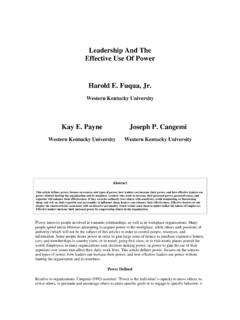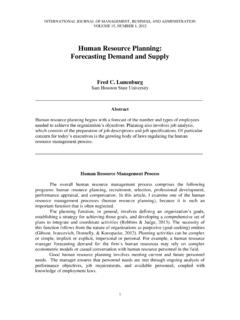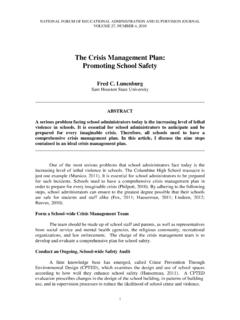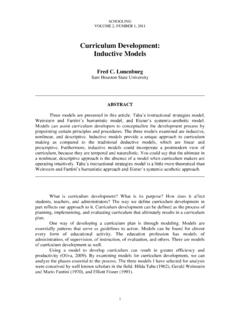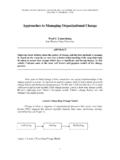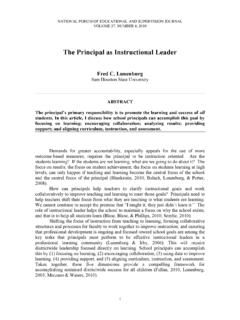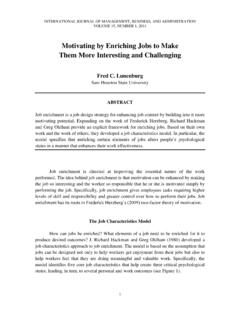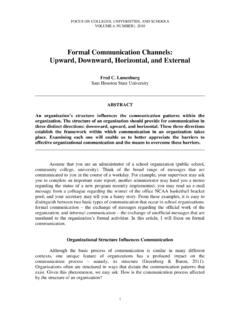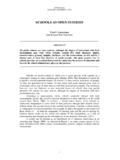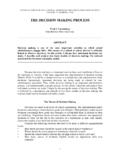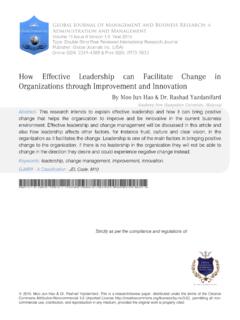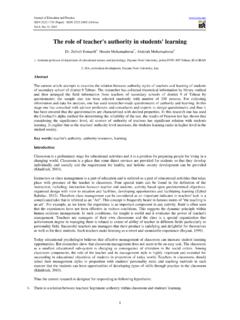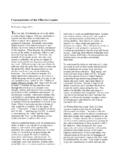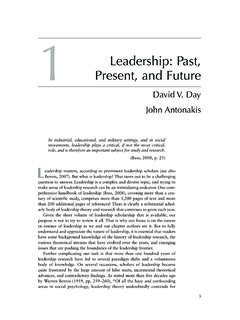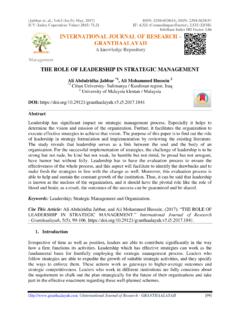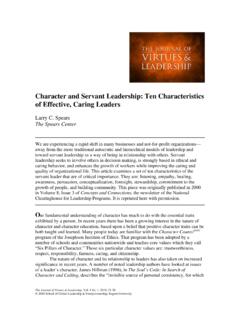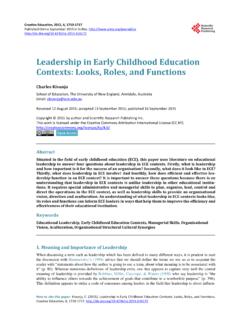Transcription of Power and Leadership: An Influence Process
1 INTERNATIONAL JOURNAL OF MANAGEMENT, BUSINESS, AND ADMINISTRATION VOLUME 15, NUMBER 1, 2012 1 Power and leadership : An Influence Process Fred C. Lunenburg Sam Houston State University ABSTRACT Power is the ability to Influence others. One of the most influential theories of Power comes from the work of French and Raven, who attempted to determine the sources of Power leaders use to Influence others. French and Raven identified five sources of Power that can be grouped into two categories: organizational Power (legitimate, reward, coercive) and personal Power (expert and referent).
2 Generally, the personal sources of Power are more strongly related to employees job satisfaction, organizational commitment, and job performance than are the organizational Power sources. One source of organizational Power coercive Power is negatively related to work outcomes. However, the various sources of Power should not be thought of as completely separate from each other. Sometimes leaders use the sources of Power together in varying combinations depending on the situation. A new concept of Power , referred to as empowerment, has become a major strategy for improving work outcomes.
3 What comes to mind when you think of the term Power ? Does it elicit positive or negative feelings? In both research and practice, Power has been described as a dirty word. Consider the Enron scandal (McLean & Elkind, 2003). Certainly it is easy to think of leaders who have used Power for unethical or immoral purposes (Brown, 2006; Flynn, 2011; Price, 2009). That said, people who have Power , deny it; people who want Power , try not to look like they are seeking it; and those who are good at acquiring it are secretive about how they got it (Robbins & Judge, 2011).
4 Great leaders have the following in common: they have a vision to achieve large-scale ideas that they dream of accomplishing, and they have the personal Power to enact it (Gibson, Ivancevich, Donnelly, & Konopaske, 2012). For example, such business leaders as the late Steve Jobs of Apple Computer, Bill Gates of Microsoft, Mark Zuckerberg of Facebook, Jeff Bezos of , Phil Knight of Nike, and Sam Walton of Wal-Mart had strong visions of the future. They were able to transform their visions into reality, because they had acquired and used the necessary Power to do so.
5 Great leaders make things happen by utilizing personal Power (Pfeffer, 2011). INTERNATIONAL JOURNAL OF MANAGEMENT, BUSINESS, AND ADMINISTRATION 2_____ Power is a natural Process in the fabric of organizational life (Haugaard & Clegg, 2012; McClelland & Burnham, 2003). Getting things done requires Power (Pfeffer, 2003). Every day, managers in public and private organizations acquire and use Power to accomplish organizational goals. Given that, you need to understand how Power is acquired, know how and when to use it, and be able to anticipate its probable effects.
6 The concepts of Power and leadership are closely linked. Leaders use Power as a means of attaining group goals. By learning how Power operates in organizations, you will be better able to use that knowledge to become a more effective leader. In its simplest terms, Power is the ability to Influence someone else (Nelson & Quick, 2012). Sources of Power in Organizations Where does Power come from? What gives a person or group Influence over others? More than 50 years ago social scientists John French and Bertrand Raven (1959) proposed five sources of Power within organizations: legitimate, reward, coercive, expert, and referent.
7 Many researchers have studied these five sources of Power and searched for others (Carson & Carson, & Roe, 1993; Finkelstein, 1992; Podsakoff & Schreisheim, 1985). For the most part, French and Raven s Power sources remain intact. Legitimate Power Legitimate Power is a person s ability to Influence others behavior because of the position that person holds within the organization. Legitimate or position Power , as it is sometimes called, is derived from a position of authority inside the organization, often referred to as formal authority.
8 That is, the organization has given to an individual occupying a particular position the right to Influence direct certain other individuals. Those with legitimate Power have the understood right to ask others to do things that are considered within the scope of their authority. When a manager asks an employee to work late to complete a project or to work on one task instead of another, he or she is exercising legitimate Power . Managers can enhance their position Power by formulating policies and procedures. For example, a manager might establish a requirement that all new hires must be approved by said manager, thus exercising authority over hiring (DuBrin, 2009).
9 Subordinates play a major role in the exercise of legitimate Power . If subordinates view the use of Power as legitimate, they comply (Gibson, Ivancevich, Donnelly, & Konopaske, 2012). That is, legitimate Power covers a relatively narrow range of Influence and, therefore, it may be inappropriate to overstep these bounds (Greenberg, 2011). For example, a boss may require his secretary to type a company document. However, it would be an abuse of Power to ask that secretary to type his doctoral dissertation. The secretary may decide to complete the task, but doing so would not be within the scope of the boss s formal authority.
10 Legitimate authority is a person s authority to make discretionary decisions as long as followers accept this discretion (Barnard, 1938: McShane & Von Glinow, 2012). FRED C. LUNENEBURG _____3 Reward Power Reward Power is a person s ability to Influence others behavior by providing them with things they want to receive. These rewards can be either financial, such as pay raises or bonuses or nonfinancial, including promotions, favorable work assignments, more responsibility, new equipment, praise, and recognition. A manager can use reward Power to Influence and control employees behavior, as long as employees value the rewards.
